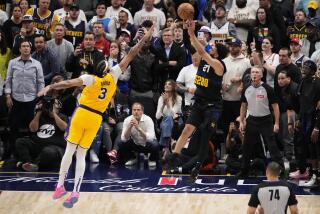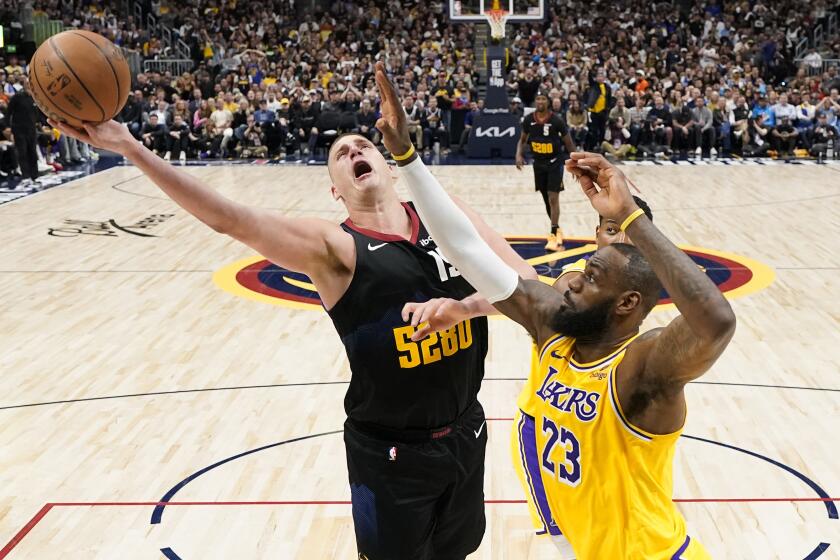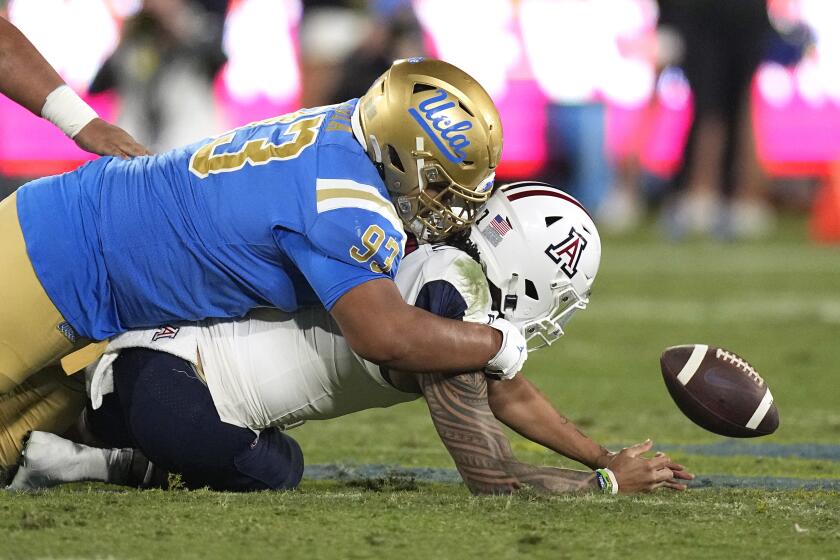Families Widened World of Sports
This country’s sporting history would be so much poorer if Michelle Kwan’s grandfather hadn’t come to California from China; if Joe Torre’s mother, Margaret, hadn’t come to New York from Italy; if Kareem Abdul-Jabbar’s grandparents hadn’t come to New York from Trinidad.
At an uncertain moment in history, when some fear that our welcoming shores, our easily crossed borders, our casual acceptance of people from everywhere, our willingness to educate students from all over the world have left us vulnerable to terrorist attacks, a very special exhibit opened last week at the Museum of Tolerance on Pico Boulevard.
Called “Finding Our Families, Finding Ourselves,” and produced by actor and comedian Billy Crystal and his wife Janice, the exhibit, through the stories of famous Americans, helps us learn how this country became the great “melting pot.” It also urges us all to investigate our own pasts. It begs us to talk to parents and grandparents, research family trees, talk to aunts and uncles. It suggests we will be poorer for not knowing about our Italian or Chinese roots, about our Croatian or French or African backgrounds.
Four athletes -- figure skater Kwan, New York Yankee Manager Torre, former UCLA and Laker center Abdul-Jabbar and former San Francisco 49er quarterback Steve Young, a Mormon who has become immersed in the study of genealogy -- joined the Crystals, poet and historian Maya Angelou, musician Carlos Santana, author and poet Sherman Alexie and talk-show host and author Cristina Saralegui Monday at the opening of the exhibit.
It is a moving multimedia experience that has transformed the third floor of the museum into a series of rooms depicting the memories of their family immigrants by Crystal, Torre, Angelou and Santana. A moving tribute to the U.S. was also given through a video on which Kwan’s grandfather, Abdul-Jabbar’s grandparents and Young’s grandfather were introduced to us.
Kwan doesn’t know what she’d be if her grandfather, Kwan Ho Yu, had not put on his best suit and taken a ship from China to California. Maybe Kwan would work in a field or a factory or maybe she wouldn’t work at all.
For sure, Kwan knows that she would not be a four-time figure skating world champion or a seven-time national champion or the owner of Olympic silver and bronze medals. She would not be a 22-year-old with so many options -- attending UCLA or skating at the top of her game, tempted by the thought of a third Olympic experience but also by a future that will allow her to be whatever it is she wants.
“My grandfather couldn’t speak English, he couldn’t even read Chinese,” Kwan said, “but he knew he was running to a better life. And in this country, anybody can have a better life.”
For Crystal, a huge Yankee fan and a lover of baseball history, it was natural to make athletes part of this project and to make a Yankee the focus of one of the exhibit rooms.
Torre, with his older sister, Rae, and his oldest son, Michael, sitting on either side of him, looked around at the re-creation of his family’s kitchen and tears came to his eyes. Torre was the youngest of five. The focus of his life, Torre said, was the kitchen table because that’s how it was for Italian families.
It was not an idyllic life. Torre has written honestly and now speaks freely about an abusive father who used words to torment him and his siblings and who used more physical methods to intimidate his mother. “My father was born in the U.S., my mother wasn’t,” Torre said, “and my father never let my mother forget that.
“That experience has really shaped the way I deal now with a game where players are coming from all over the world.”
The abuse, Torre said, finally led the Torre boys to confront their father. “We convinced him to leave the house,” Torre said. “And he did.”
After Crystal had asked Kwan to participate, she said she began talking to her grandfather in ways she never had before.
“I just started asking him questions and found out he had all these stories that he wanted to tell us, if only we’d ask,” Kwan said.
As part of the exhibit, there is a photo of Kwan’s grandfather. A proud-looking man stands with shoulders square, back straight and eyes full of life. He is wearing a neat, light suit and standing on the deck of the boat that would bring him to the United States.
“My grandfather came here and worked hard so that all of us could do what we wanted,” Kwan said. “My mom and dad ran a restaurant so my brother and sister and I could do what we wanted. Now I skate so that, hopefully, someday my children can do what they want. I can honestly say that there is no place else in the world where this could happen.”
Abdul-Jabbar figures he might be the world’s largest pipe fitter or a worker in the oil industry if his grandparents hadn’t come to the U.S. from Trinidad. “My grandfather was a cop,” Abdul-Jabbar said. “He had to pick up and deliver prisoners from one side of the island to the other. Every day, all he did was deal in misery. He wanted to leave that.”
Abdul-Jabbar’s grandparents, who had never left Trinidad, took a boat from Trinidad to Belize, then from Belize to Mobile, Ala., then a train from Mobile to New York. “My grandmother kept waiting to see the ocean again,” Abdul-Jabbar said. “The train took three days. My grandmother couldn’t believe any place was so big. She was sure she was coming to the end of the world.”
It turned out to be a beginning.
“It is true,” Abdul-Jabbar said, “that anything is possible in this country. And that is true most of all in the field of athletics.”
Where else, Abdul-Jabbar said, “can a Yao Ming come to this country and in two months be voted onto the NBA All-Star team and be doing TV commercials that are all over television?”
Where else, Torre said, “can an athlete like Ichiro come from Japan and be accepted immediately based on nothing more than his talent?”
There would be shame, Torre said, if we, out of fear, begin restricting immigration. “We can take it,” Torre said. “We might be the only country in the world that can.”
*
Diane Pucin can be reached at diane.pucin@latimes.com.
More to Read
Get our high school sports newsletter
Prep Rally is devoted to the SoCal high school sports experience, bringing you scores, stories and a behind-the-scenes look at what makes prep sports so popular.
You may occasionally receive promotional content from the Los Angeles Times.






